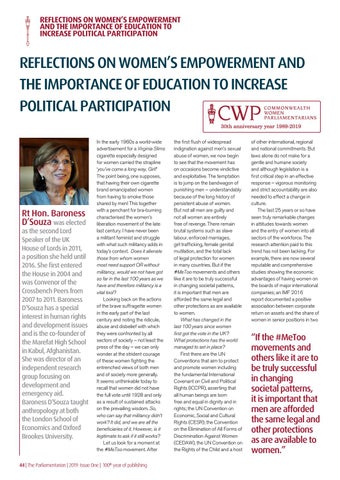REFLECTIONS ON WOMEN’S EMPOWERMENT AND THE IMPORTANCE OF EDUCATION TO INCREASE POLITICAL PARTICIPATION
REFLECTIONS ON WOMEN’S EMPOWERMENT AND THE IMPORTANCE OF EDUCATION TO INCREASE POLITICAL PARTICIPATION
Rt Hon. Baroness D’Souza was elected
as the second Lord Speaker of the UK House of Lords in 2011, a position she held until 2016. She first entered the House in 2004 and was Convenor of the Crossbench Peers from 2007 to 2011. Baroness D’Souza has a special interest in human rights and development issues and is the co-founder of the Marefat High School in Kabul, Afghanistan. She was director of an independent research group focusing on development and emergency aid. Baroness D’Souza taught anthropology at both the London School of Economics and Oxford Brookes University.
In the early 1960s a world-wide advertisement for a Virginia Slims cigarette especially designed for women carried the strapline ‘you’ve come a long way, Girl!’ The point being, one supposes, that having their own cigarette brand emancipated women from having to smoke those shared by men! This together with a penchant for bra-burning characterised the women’s liberation movement of the late last century. I have never been a militant feminist and struggle with what such militancy adds in today’s context. Does it alienate those from whom women most need support OR without militancy, would we not have got so far in the last 100 years as we have and therefore militancy is a vital tool? Looking back on the actions of the brave suffragette women in the early part of the last century and noting the ridicule, abuse and disbelief with which they were confronted by all sectors of society – not least the press of the day – we can only wonder at the strident courage of these women fighting the entrenched views of both men and of society more generally. It seems unthinkable today to recall that women did not have the full vote until 1928 and only as a result of sustained attacks on the prevailing wisdom. So, who can say that militancy didn’t work? It did, and we are all the beneficiaries of it. However, is it legitimate to ask if it still works? Let us look for a moment at the #MeToo movement. After
44 | The Parliamentarian | 2019: Issue One | 100th year of publishing
the first flush of widespread indignation against men’s sexual abuse of women, we now begin to see that the movement has on occasions become vindictive and exploitative. The temptation is to jump on the bandwagon of punishing men – understandably because of the long history of persistent abuse of women. But not all men are guilty and not all women are entirely free of revenge. There remain brutal systems such as slave labour, enforced marriages, girl trafficking, female genital mutilation, and the total lack of legal protection for women in many countries. But if the #MeToo movements and others like it are to be truly successful in changing societal patterns, it is important that men are afforded the same legal and other protections as are available to women. What has changed in the last 100 years since women first got the vote in the UK? What protections has the world managed to set in place? First there are the UN Conventions that aim to protect and promote women including the fundamental International Covenant on Civil and Political Rights (ICCPR), asserting that all human beings are born free and equal in dignity and in rights; the UN Convention on Economic, Social and Cultural Rights (CESR); the Convention on the Elimination of All Forms of Discrimination Against Women (CEDAW), the UN Convention on the Rights of the Child and a host
of other international, regional and national commitments. But laws alone do not make for a gentle and humane society and although legislation is a first critical step in an effective response – vigorous monitoring and strict accountability are also needed to effect a change in culture. The last 25 years or so have seen truly remarkable changes in attitudes towards women and the entry of women into all sectors of the workforce. The research attention paid to this trend has not been lacking. For example, there are now several reputable and comprehensive studies showing the economic advantages of having women on the boards of major international companies; an IMF 2016 report documented a positive association between corporate return on assets and the share of women in senior positions in two
“If the #MeToo movements and others like it are to be truly successful in changing societal patterns, it is important that men are afforded the same legal and other protections as are available to women.”
